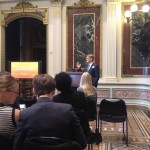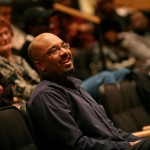 I was surprised to receive an invitation to speak at the White House this August, as part of a parental incarceration workshop sponsored by the American Bar Foundation and National Science Foundation. Though I’d written a bit on the subject and had followed the research closely for a decade, I could not claim any great expertise. Fortunately, they didn’t need me for that. They’d already assembled an impressive roster of experts to speak on topics such as demography and family dynamics, behavioral and health problems, education and exclusion, justice policy, and caring for children. My job, according to the draft agenda, was to offer “concluding comments” in the final half-hour session. Or, as John Hagan put it, “Just do what you do.”
I was surprised to receive an invitation to speak at the White House this August, as part of a parental incarceration workshop sponsored by the American Bar Foundation and National Science Foundation. Though I’d written a bit on the subject and had followed the research closely for a decade, I could not claim any great expertise. Fortunately, they didn’t need me for that. They’d already assembled an impressive roster of experts to speak on topics such as demography and family dynamics, behavioral and health problems, education and exclusion, justice policy, and caring for children. My job, according to the draft agenda, was to offer “concluding comments” in the final half-hour session. Or, as John Hagan put it, “Just do what you do.”
Riiiiight. Do what I do.
Well, I couldn’t just come out and ask what I do, so I decided to do TSP. Here’s a short version of my email response:
My plan is to come in with a few minutes of my own material, but to really spend the time synthesizing and connecting across the presentations and discussants. I’ll have to do some of this on-the-fly, but I’d be delighted if you could provide the available slides in advance. If that’s not workable, that’s ok too. I’m not planning to talk for the full half-hour, but to offer some take-home points of consensus and dissensus, inviting reactions from the experts assembled. This sort of thing might be useful in a policy group (especially reprising points made in the morning sessions that get lost by afternoon). I’ll then speak briefly about points of contact with my own research.
 So, after a strong kick-off by Bruce Western and a full day of panels by real experts, I took this approach at the podium. Seeing the slides in advance, it started to become clear how the research evidence fit together. The organizers had done a terrific job recruiting the experts. The experts, for their part, had made powerful new contributions to knowledge. And, throughout the day, an audience of policy leaders, practitioners, and political actors had been offering incisive commentary and questions.
So, after a strong kick-off by Bruce Western and a full day of panels by real experts, I took this approach at the podium. Seeing the slides in advance, it started to become clear how the research evidence fit together. The organizers had done a terrific job recruiting the experts. The experts, for their part, had made powerful new contributions to knowledge. And, throughout the day, an audience of policy leaders, practitioners, and political actors had been offering incisive commentary and questions.
As you might imagine, my notes were a hopeless mess, since I was constantly either crossing things out (when thunder was stolen) or reframing them in light of what the speakers actually said (when the best stuff wasn’t on the slides). But thinking about the talk as a TSP article, I tried to draw out five jargon-free social facts from the evidence presented — and then to connect them with the social choices and policy levers each implied.
I’m pretty sure I didn’t say anything brilliant, but I hope that I communicated something useful. Editing Contexts and TSP, I’ve learned that social scientists can sometimes be especially useful when we examine and call attention to work that is closely related but not identical to our own. And that when we take the role of reporters rather than experts, we’re pretty well positioned to identify and explain the impressive accomplishments of our colleagues.
 Very cool to see the first issue of Sociological Science, a new open-access journal for primary research articles. While I should disclose that I’m a consulting editor for the publication, I should also disclose that I can’t claim any credit for the good stuff therein:
Very cool to see the first issue of Sociological Science, a new open-access journal for primary research articles. While I should disclose that I’m a consulting editor for the publication, I should also disclose that I can’t claim any credit for the good stuff therein:![]()









